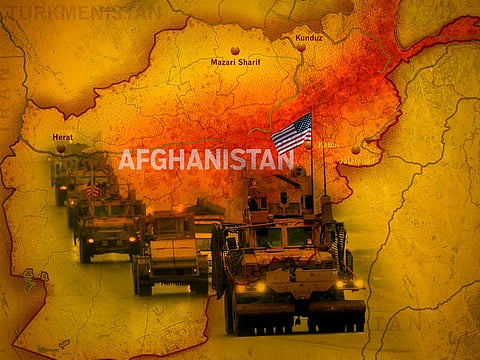Two decades after Afghanistan and Iraq, the neocon legacy lingers on
America’s twin wars in the Bush era brought nothing but destruction and chaos to region

One cannot but make a connection between the historic event demonstrated by America’s chaotic military withdrawal from Afghanistan — twenty years after it invaded that nation in response to the 9/11 terrorist attacks — to its biggest strategic miscalculation in modern history, which is its decision to invade Iraq a year and half later under false pretences. Pentagon neocons, who were in charge in 2001, were not as eager to retaliate against the Taliban and Al Qaida as much as they were urging the White House to invade Iraq.
In the words of Jonah Blank, writing in the Atlantic last April, Paul Wolfowitz, Vice President Dick Cheney and Secretary of Defence Donald Rumsfeld saw Afghanistan as a distraction from the main issue which was Iraq. All along and even before 9/11 they wanted to invade Iraq, oust Saddam Hussein and install a puppet regime whose fealty is to Washington. Blank, who was policy adviser on Asia to then head of the Senate’s Foreign Relations Committee head Joe Biden, sums up the strategic blunder of waging two successive wars this way: “The original sin of the war in Iraq was going to war in Iraq. And the original sin of the war in Afghanistan was going to war in Iraq.”
Twenty years on and following the killing of over 47,000 people, many of whom were civilians, the great superpower is forced to withdraw, leaving the Kabul government to fend for itself, while the Taliban forces move on to extend its control over government and disputed territories.
Cost of war
The contrast between Saigon 1975 and Kabul 2021 cannot be missed. Experts agree that it is only a matter of time before Kabul itself is besieged and captured. Nation building has failed in Afghanistan just as it had failed in Iraq. The Taliban never surrendered and their dogma prevails. The neocons’ objectives of containing Iran, establishing US military bases close to Russia’s Central Asian borders and creating democracies in America’s image in the region achieved little. The cost, both human and material, was high.
And while Al Qaida may have been severely weakened, its offshoots remain active in Yemen, Somalia, Libya and West Africa. And an even more dangerous offspring, Daesh, is regrouping along the Syrian-Iraqi borders. Would Iran have managed to penetrate Iraq and fan the embers of sectarian infighting if the Saddam regime survived? Would Al Qaida and later on Daesh have emerged if the US had not invaded Iraq in 2003?
America’s intervention in the Middle East and West Asia had exposed the limits of US military might. Presidents George W. Bush and Barack Obama authorised a series of military surges and committed additional assets in a bid to defeat the Taliban. But no sooner had the surges subsided than the Taliban were able to regroup and challenge both Washington and the Kabul administrations.
Legal reasons for entry?
But if America’s invasion of Afghanistan rested on the premise that Al Qaida and the Taliban were responsible for the 9/11 terrorist attacks, its incursion in Iraq had no legal bearing whatsoever. Few months after Saddam was toppled, the UN came out to say that its inspectors found no weapons of mass destruction. The death toll among Iraqis since the invasion took place had exceeded one million by 2019.
If Joe Biden, like his predecessor Donald Trump, realised that America’s longest war must come to an end at any cost — even if that meant that the Taliban would eventually violate the Doha accords and topple the Kabul government, what does that mean for US presence in Iraq?
Blank argues that the Bush administration’s obsession with Iraq had damaged US objectives in Afghanistan. After the invasion of Iraq in 2003, Blank says Afghanistan became “an afterthought” for the neocons in Washington. But the same can be argued about the grave failure in Iraq as well. Following the toppling of Saddam, the US had no idea what to do next. It immediately disbanded the Iraqi military, security, and intelligence infrastructure of Saddam, creating a massive security vacuum in the country.
America's legacy
It was this vacuum that opened the door to pro-Iran politicians and their followers to form armed militias outside the state’s control. That was followed by a bloody sectarian civil war that led to the emergence of Daesh. America’s legacy in Iraq is a disgraceful one — mass corruption, failing public services, dozens of armed militias and a deepening sectarian divide.
With the Iraqi parliament calling on US troops to withdraw, the US only reason to stay now is to contain Iranian influence while it negotiates rejoining the nuclear deal in Vienna. But even then it is clear that the US original objective in Iraq has been a dismal failure.
With the pivot to Asia, which began under Obama and continues under Biden, it is not clear what the US strategy is for its continued presence in the Middle East. The US will likely withdraw from Iraq just as it did from Afghanistan; leaving geopolitical chaos in its wake. But has the neocon mantra been defeated?
For Biden the old foes, Russia and China, are also the new foes. America’s withdrawal from Afghanistan, and later from Iraq, will be met by strategic responses by Moscow and to a lesser extent by Beijing.
America leaves behind weaker central governments and alliances. The vacuum will be filled by regional and global powers including Turkey and Iran. Two decades later America’s twin wars in Afghanistan and Iraq have brought nothing but destruction and chaos to the region. The neocons bitter legacy will be felt for decades to follow.
Osama Al Sharif is a journalist and political commentator based in Amman.
Sign up for the Daily Briefing
Get the latest news and updates straight to your inbox









